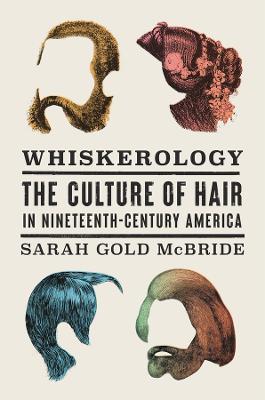
Whiskerology
Sarah Gold McBride
£27.95
Description
A surprising history of human hair in nineteenth-century America, where length, texture, color, and coiffure became powerful indicators of race, gender, and national belonging.
Hair is always and everywhere freighted with meaning. In nineteenth-century America, however, hair took on decisive new significance as the young nation wrestled with its identity. During the colonial period, hair was usually seen as bodily discharge, even “excrement.” But as Sarah Gold McBride shows, hair gradually came to be understood as an integral part of the body, capable of exposing truths about the individuals from whom it grew-even truths they wanted to hide.
As the United States diversified-intensifying divisions over race, class, citizenship status, and region-Americans sought to understand and classify one another through the revelatory power of hair: its color, texture, length, even the shape of a single strand. While hair styling had long offered clues about one’s social status, the biological properties of hair itself gradually came to be seen as a scientific tell: a reliable indicator of whether a person was a man or a woman; Black, white, Indigenous, or Asian; Christian or heathen; healthy or diseased. Hair was even thought to illuminate aspects of personality-whether one was courageous, ambitious, or perhaps criminally inclined. Yet if hair was a teller of truths, it was also readily turned to purposes of deception in ways that alarmed some and empowered others. Indeed, hair helped many Americans to fashion statements about political belonging, to engage in racial or gender passing, and to reinvent themselves in new cities.
A history inscribed in bangs, curls, and chops, Whiskerology illuminates a period in American history when hair indexed belonging in some ways that may seem strange-but in other ways all too familiar-today.
Publisher Review
Whiskerology is a delightful, meticulously researched deep dive into the history of hair in nineteenth-century America. Exploring the intersection of body and identity in US history, Sarah Gold McBride untangles and redefines our understanding of our tresses, locks, and curls. Through vivid storytelling, she unveils how hair has long shaped and reflected cultural anxieties about race, ethnicity, and gender. The result is a fascinating account of how something as intimate and ubiquitous as hair became a public marker of power and belonging. — Zahra Hankir, author of Eyeliner: A Cultural History Gold McBride’s fascinating study invites us to take human hair seriously. Nineteenth-century Americans, we learn, saw hair as a body part that expressed truths about one’s identity and character. Some even saw racial ancestry in the structure of each individual hair. I will never look at hair the same way again! — Kathleen M. Brown, author of Foul Bodies: Cleanliness in Early America An illuminating history of an unruly ‘appendage.’ Once considered mere dead matter, hair was reconceptualized in the nineteenth century-when its hue and texture, volume and silhouette came to signal supposedly unalterable aspects of identity. Gold McBride deftly showcases the ways in which hair has been used to define, defend, and contest the boundaries of race and gender. — Hannah Carlson, author of Pockets: An Intimate History of How We Keep Things Close In this innovative and surprising history, Gold McBride reveals wigs, moustaches, and hair dye to be about much more than fashion. Many nineteenth-century Americans fixated on hair as evidence of an individual’s place in supposedly natural hierarchies, even as they feared that people were disguising themselves through widespread ‘hair fraud.’ Whiskerology shows that you can’t understand the history of gender, race, or class without thinking about hair. — Corinne Field, author of The Struggle for Equal Adulthood: Gender, Race, Age, and the Fight for Citizenship in Antebellum America
Find this book on the following lists
-
June 2025 New Releases: History
Browse The List
Book experts at your service
What are you looking for?
